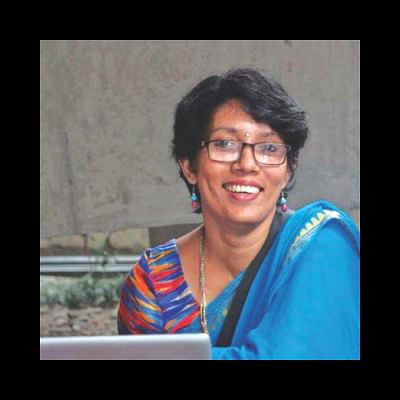Samina Luthfa Nitra

She is a woman of multiple talents: a veteran playwright and actor with more than 20 years of experience, and also a respected Associate Professor at Dhaka University. Having seen a lot of ups and downs in the theatre scene throughout the years, the veteran actor shares her views about the current theatre scene, her recent projects and the art of theatre itself. Star Showbiz presents an honest interview with Samina Luthfa Nitra!
Thank you so much for your time ma'am. Can you tell us about your recent projects?
I have recently performed at the Dhaka Art Summit, in a play named Rehearsing the Witness. It was directed by Zuleikha Choudury and was based on the infamous Bhawal Court Case. It was a very interesting project, and was aimed towards shedding light on how the concept of identity is created in today's global society. There were activists and scholars from Bangladesh, India, UK and USA present there, and all of us actors had a hand in modifying the script. It was an amazing experience.
Could you tell why theatre isn't as popular as some other mediums of entertainment, for example television or radio?
I think this is a very important question. You see, other medias usually have a huge corporate backing behind them, which is missing in theatre. A good financial backup is necessary for any form of entertainment to prosper. It is not that we are not producing great plays, because we are. However, the incentive to do so keeps lessening as the actors, producers and playwrights aren't financially rewarded for that. Even in your neighboring countries, you will see that the government has a salary for theatre artists, which is not present here. From 20 years of experience in this field, I will say that if you make something great, people are bound to see it. However, the incentive to innovate has to be there.
You are a well recognized and established name in your art. But how difficult is it for smaller theatre groups to make a name for themselves in the scene?
I'll be frank, it is very difficult indeed. There are a lot of groups and not many halls to perform in. You will often see that there is a lot of politics surrounding the federation and the halls regarding getting dates to perform. If all your time and energy is spent behind just getting dates, when will you even have the time to put the effort to make a good play? I think we need a big change in how things are run, or else the future doesn't seem too bright. The Federation, which once brought a revolution in idealistic movement and art, is now a hub for politics and groupism. The society has changed drastically, and so should they. Only then can the industry prosper and produce new names.
Could you tell us some of the memorable moments and achievements in your illustrious career?
One would obviously be the first play that I wrote, Teerthankar. We had done over 70 shows at a stretch when it debuted, and it was huge because I was very new in the scene. The fact that the great luminary Kabir Chowdhury translated my play titled Khona was also a huge achievement for me. The fact that my group BotTala has done so well over the years brings me great pleasure and joy. I can proudly say that we have a different character than other theatre groups. I had played Colonel Taher in a small scene in Crutch er Colonel, and that will also be a very memorable part that I did as an actor.
Describe yourself in one word.
It is difficult in one word, but I will use three: Teacher, Activist, Actor.
Do you have any message for the readers?
I will say that theatre is an experience that opens up the mind, and everyone should experience it either as a performer or as an audience. I would urge the readers to come and watch the plays that we put on, because a lot of hard work goes behind them.

 For all latest news, follow The Daily Star's Google News channel.
For all latest news, follow The Daily Star's Google News channel. 



Comments